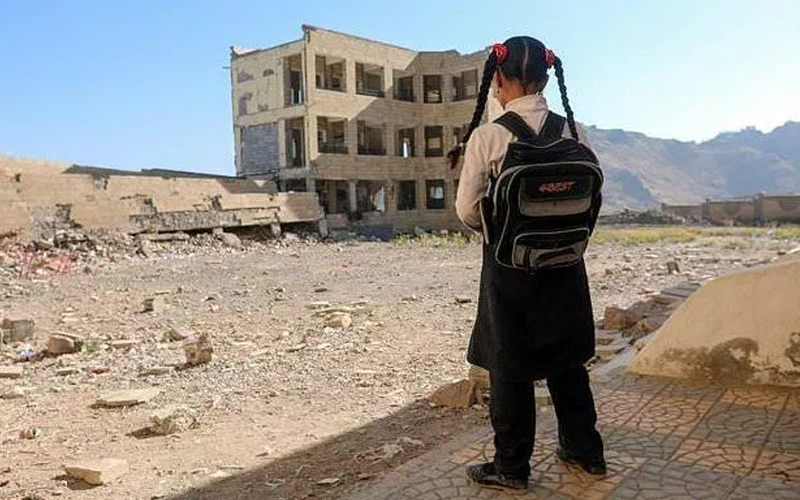Khokha: Mohammad Abkar thought he would be home by the time Ramadan rolled around, but the Yemeni father of three will spend the Muslim holy month in a camp — displaced.
The fasting month begins on Monday amid a war that has triggered what the UN calls the world’s worst humanitarian crisis pushing millions to the brink of famine.
Abkar and his family were driven out of their village of Al-Munther in June last year when government forces backed by a Saudi-led coalition launched a fierce campaign against Huthi rebels in the nearby Red Sea city of Hodeida.
Hundreds of families were forced to flee the port city and its surrounds.
“We have been here for about a year. A whole year, and we’re still displaced,” Abkar tearfully told AFP from a camp in government-controlled Khokha, about 130 kilometres (80 miles) south of Hodeida.
“We will remain patient, and the rest is in God’s hands.”
The warring parties agreed to a truce deal on Hodeida in Sweden in December giving people a glimmer of hope, but one that is quickly fading as fighting continues.
Most families have been unable to return to their homes over fears they could be caught in the crossfire.
Abkar is no exception.
He left his home with nothing but the clothes on his back and the crutches he desperately needs to walk.
Abkar and his wife have three children — all of them are disabled. They are living through extremely difficult circumstances in a makeshift tent pitched on sand.
Fasting from dawn until dusk during Ramadan will be no easy feat as summer temperatures soar.
“Back at home, we used to get all sorts of food during Ramadan, such as soup and yogurt, but this year we are displaced,” said Abkar.
“I am disabled, and my children are disabled, and that it is why we cannot work.”
Abkar, although grateful for the food aid he receives every month, said he had one message to the world: “Look at us. Look at me and my family.”
– ‘Full of mortar shells’ –
The Huthis have been fighting government forces since 2014, but the war escalated a year later when the Saudi-led coalition intervened against the Iran-aligned rebels.
The conflict has killed tens of thousands people, many of them civilians, relief agencies say.
The war has left 3.3 million people displaced and 24.1 million — more than two-thirds of the population — in need of aid in a country that has long been the Arab world’s most impoverished.
Fighting in Hodeida, whose port serves as a lifeline to the rest of Yemen, has largely stopped since the ceasefire went into effect on December 18, but there have been intermittent clashes.
Both the government and the Huthis have been accused of violating the Hodeida truce, while an agreed redeployment of forces has yet to be implemented.
The conflict shows no signs of abating even in the holy month.
A pro-government force told AFP on Saturday that the rebels have been digging dozens of tunnels under Hodeida’s ports and airport — bordering Abkar’s home of Al-Munther.
For Hodeida resident Hoda Ibrahim, 39, it is imperative the warring parties abide by the ceasefire at least during Ramadan.
That is her only hope, she said.
“We are constantly looking for gas and fuel, and we do not even have the time to experience the spirituality of this month,” said the mother of four.
“Ramadan this year is full of mortar shells, and we hope the situation won’t get worse.”
– ‘Blocked in’ –
About 230 kilometres east of Hodeida in the rebel-held capital, residents are also struggling to provide for their families during the fasting month — which every year witnesses an increase in prices.
Many have lost their jobs during the conflict and most government employees have gone unpaid since August 2016, after the central bank was relocated from Sanaa to Aden — the government’s temporary capital.
Saudi Arabia, along with the United Arab Emirates, another key coalition member, last month offered $200 million in aid to Yemen especially for Ramadan.
Reem al-Hashimi, the UAE minister of state for international cooperation, last week accused the rebels of blocking his country’s aid from reaching areas under their control, including Sanaa.
Mohammed Hussein, a resident of the rebel-held capital, said his family can’t observe Ramadan the way they used to.
“We can no longer prepare for the holy month the way we did before (the conflict),” he said. “We no longer are able to make purchases because we are blocked in and have no salaries.”
[source_without_link]Agence France-Presse[/source_without_link]

